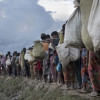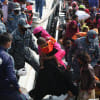Rohingya Repatriation: Myanmar building a camp for 30,000
Myanmar is building a camp to temporarily house 30,000 repatriated Rohingyas who fled violence in Rakhine, Myanmar's state media reported as the Joint Working Group held its first meeting in Naypyitaw to discuss ways of implementing a repatriation deal yesterday.
More than 673,000 Rohingyas have headed across the border to Bangladesh after a sweeping Myanmar army counteroffensive in response to Rohingya militant attacks on August 25 last year.
The crackdown, described by the United States and UN as ethnic cleansing, created a global outcry.
Myanmar signed a repatriation deal on November 23, and subsequently a Joint Working Group, comprising of officials from Bangladesh and Myanmar, was formed on December 19.
The Bangladesh foreign secretary is leading the 14-member Bangladesh delegation in the meeting. Its outcome could not be known yet.
Meanwhile, Myanmar's state-run newspaper, Global New Light of Myanmar, said they were building a camp in Hla Po Khaung in northern Rakhine.
“The 124-acre Hla Po Khaung will accommodate about 30,000 people in its 625 buildings,” it said, adding that the construction of some 100 buildings would be completed by the end of January, reports Reuters.
Aung Tun Thet, chief coordinator of Myanmar's Union Enterprises for Humanitarian Assistance, Resettlement and Development, told Reuters that the camp in Hla Po Khaung would be a “transition place” for Rohingya refugees before they are repatriated to their “place of origin” or the nearest settlement to their place of origin.
“We will try to accept all of those who are coming back to Myanmar,” he said, adding that to verify returnees' residency, they would be sent to assessment camps in Taungpyoletwei or Ngakhuya before they are moved to the Hla Po Khaung camp.
Soe Aung, permanent secretary of Myanmar's ministry of social welfare, relief and resettlement, said returnees would spend “at least one or two months” in Hla Po Khaung before their new homes are built.
It is unclear, however, how many returnees would qualify for citizenship in Myanmar. The authorities have said Rohingya Muslims could apply for citizenship if they can show their ancestors lived in Myanmar. But the latest deal -- like the one in 1992 -- does not guarantee citizenship.
Buddhist-majority Myanmar has for years denied Rohingyas citizenship, freedom of movement and access to basic services such as healthcare and education. They are considered illegal immigrants from Bangladesh.
Meanwhile, Win Myat Aye, the minister of social welfare, relief and resettlement, told AP that “We are planning ahead to be able accept the returnees from next week and we are sure that this will be done on time.”
The UN refugee agency said it is not involved in the process but is willing to play a “constructive role” in the process if allowed, specifically in registering the refugees and helping determine whether they are returning to Myanmar voluntarily.
“Our involvement in the process and our full access to areas of return in Myanmar can help build confidence for all concerned, including the refugees,” said Vivian Tan, UNHCR's senior regional communication officer.
In the November agreement, Myanmar's civilian government, led by Aung San Suu Kyi, pledged to take measures to halt the outflow of Rohingyas to Bangladesh and restore normalcy in the region.
The UN and other rights groups have urged the Myanmar government to ensure the safe and voluntary return of the Rohingya refugees.
Many have questioned whether Rohingyas would return to Myanmar under the current circumstances when many Rohingyas are still fleeing to Bangladesh.
United Nations agencies and human rights bodies have voiced scepticism about the resettlement plans and demanded a more transparent process to safeguard the Rohingya's voluntary return.

 For all latest news, follow The Daily Star's Google News channel.
For all latest news, follow The Daily Star's Google News channel. 








Comments